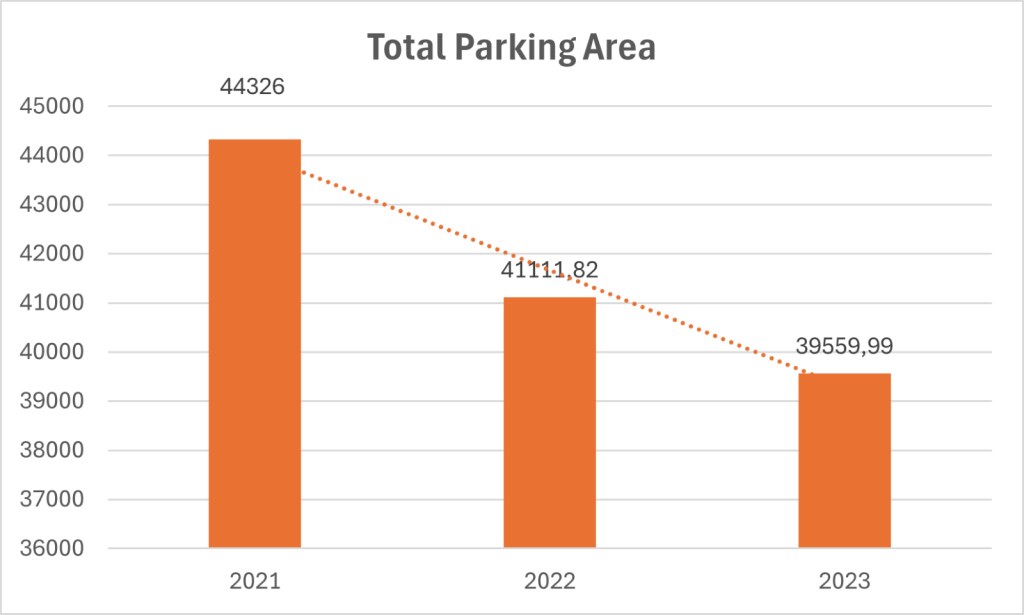UGM actively promotes sustainable commuting through awareness campaigns and community engagement. Workshops, seminars, and informational materials are provided to educate the university community about sustainable transportation’s benefits and encourage participation in these initiatives.
Since it is difficult to stop using private vehicles entirely, reducing parking areas on campus is a bold step toward sustainable commuting aimed at encouraging alternative transportation methods and minimising the environmental impact of private vehicles. In 2023, UGM reduced its total parking area by 4,766.02 m², or 10.75%, compared to 2022 (see figure below). Several former parking areas were repurposed as green spaces and rainwater infiltration zones.
Despite the reduction, the 39,559.99 m² of parking space available on campus is more than enough to accommodate UGM’s 62,000 students and 8,000 staff (requiring a parking area of approximately 32,451 square metres). While no additional parking areas were added in 2023, UGM prioritised optimising existing facilities, introducing parking sticker systems, and enforcing regulations. Staff parking areas are made available to the public during events to accommodate increased demand.

Decreasing parking area on campus from 2021 to 2023
For the UGM community, parking area restrictions directly reduce the number of individual vehicles. UGM Rector’s Regulation No. 4088/P/SK/HT/2010 on vehicle identification cards is also having a direct impact. For example, UGM has a Free Pollution Policy enforced around the UGM Rectorate Precinct. Vehicles without a permit to enter the precinct are not allowed to enter, which helps reduce the amount of vehicles emitting carbon emissions into this designated area.


Along with regulations placed directly on campus, UGM actively promotes sustainable commuting through various workshops and seminars aimed at fostering environmentally friendly transportation practices at the local, national, and global levels. In October 2024, UGM’s Center for Transportation and Logistics Studies (Pustral UGM) collaborated with Austrian experts to address urban mobility challenges and sustainability. The workshop, titled “Revisiting Sustainable Urban Mobility: A New Approach,” discussed key challenges in promoting sustainable mobility and the role of technology in achieving sustainability targets (UGM and Austrian Experts Address Urban Mobility Challenges and Sustainability)
In June 2024, UGM hosted the “Regional Workshop on Sustainable Campus for Universities in Asia-Pacific: Green Technology for Sustainable Development.” This event is a collaboration with the UIGreenmetric Networks and focused on integrating green technology into campus operations, including transportation, to promote sustainability (Regional Workshop on Sustainable Campus for Universities in Asia-Pacific).
UGM regularly conducts seminars as part of its commitment to the Sustainable Development Goals (SDGs). These seminars often cover topics on sustainable cities and communities, including sustainable transportation and commuting practices (SDGs Seminar Series).
The Center for Transportation and Logistics Studies at Universitas Gadjah Mada (PUSTRAL UGM) actively promotes sustainable commuting through various events and initiatives
On November 6, 2023, a seminar titled “Indonesia Decarbonization Pathways for Sustainable Urban Mobility” was held, focusing on strategies to reduce carbon emissions in urban transportation.
In celebration of its 23rd anniversary, PUSTRAL UGM conducted a Webinar on July 31, 2024, themed “Green Transportation, Decarbonization, and Sustainable Development: Realities, Hopes, and Challenges.” The event discussed the integration of green transportation solutions to promote sustainable commuting.
PUSTRAL UGM collaborates with international organisations to host workshops aimed at developing sustainable urban mobility models. For example, in July 2024, Pustral’s stakeholder workshop was conducted in partnership with The World Bank and the International Transport Forum (ITF) to assist the Indonesian government in creating effective decarbonisation roadmaps for urban transportation.
References:
- Rector’s Regulation No. 4088/P/SK/HT/2010
- UGM and Austrian Experts Address Urban Mobility Challenges and Sustainability
- Regional Workshop on Sustainable Campus for Universities in Asia-Pacific
- SDGs Seminar Series
- PUSTRAL UGM
- Webinar Green Transportation, Decarbonization, and Sustainable Development: Realities, Hopes, and Challenges
- Pustral’s stakeholder workshop
